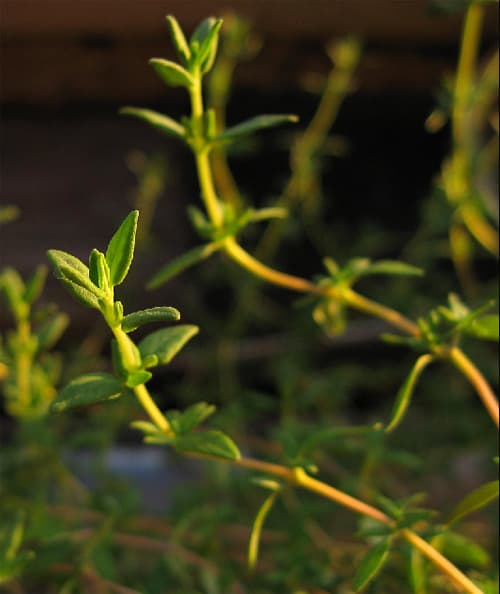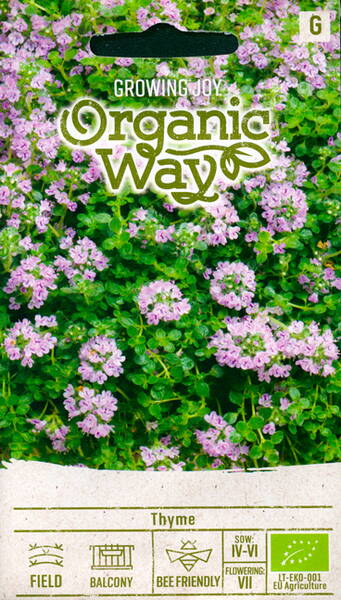Your shopping cart is empty!
Garden thyme
Garden thyme.
Flowers: Summer.
The origin of the word "thyme" is "to fumigate" and it was used originally as incense. It was considered in ancient and medieval days to be a great source of invigoration. Like lavender the dried flowers can be used to scent and preserve linen. It is a favourite garden plant attracting bees and the honey produced has a wonderful fine flavour. An excellent herb for cooking, it is used for flavouring sauces, pickles, stews and soups.
Applications: antiseptic, antispasmodic and can be used as a tonic. In aromatherapy and perfumery the oil can be used for massage and is good to combat coughs, sore throats and cranky digestion. It can be massaged into the chest, throat, feet or back. Essence of thyme is sometimes used for cosmetics and rice powder. Thyme yields fragrant oils and can be used for scenting soaps. A tea made from the leaves is good for the chest, nausea, and the onset of migraine, sore throats and general germs. The tea is also good for bathing cuts and wounds.
Bath: a liquid made from leaves into a tea is good to add to a bath and can be used as a hair rinse. It has been said that the tea will stop hair falling out if rubbed into the scalp.
A perennial, medicinal, decorative, nectariferous , spice herb. Grows best in permeable, potassium loam or sandy loam, in a sunny place. Plants are cut down at the beginning of bloom process. Fresh and dried leaves, young shoots and blooms are used. Fits meat dishes, sauces, roasts marinates as a seasoning. Thyme tea is drank when you have respiratory diseases.
There is no need to fertilize the plants.
There are no diseases and pests on thyme.
1,0 g = 3400-4800 seeds.
Flowers: Summer.
The origin of the word "thyme" is "to fumigate" and it was used originally as incense. It was considered in ancient and medieval days to be a great source of invigoration. Like lavender the dried flowers can be used to scent and preserve linen. It is a favourite garden plant attracting bees and the honey produced has a wonderful fine flavour. An excellent herb for cooking, it is used for flavouring sauces, pickles, stews and soups.
Applications: antiseptic, antispasmodic and can be used as a tonic. In aromatherapy and perfumery the oil can be used for massage and is good to combat coughs, sore throats and cranky digestion. It can be massaged into the chest, throat, feet or back. Essence of thyme is sometimes used for cosmetics and rice powder. Thyme yields fragrant oils and can be used for scenting soaps. A tea made from the leaves is good for the chest, nausea, and the onset of migraine, sore throats and general germs. The tea is also good for bathing cuts and wounds.
Bath: a liquid made from leaves into a tea is good to add to a bath and can be used as a hair rinse. It has been said that the tea will stop hair falling out if rubbed into the scalp.
A perennial, medicinal, decorative, nectariferous , spice herb. Grows best in permeable, potassium loam or sandy loam, in a sunny place. Plants are cut down at the beginning of bloom process. Fresh and dried leaves, young shoots and blooms are used. Fits meat dishes, sauces, roasts marinates as a seasoning. Thyme tea is drank when you have respiratory diseases.
There is no need to fertilize the plants.
There are no diseases and pests on thyme.
1,0 g = 3400-4800 seeds.

Garden thyme, English thyme, French thyme.















